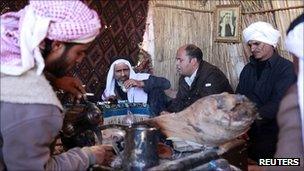Bedouin in Egypt's Sinai 'end siege of monitor camp'
- Published

Bedouin tribes in the Sinai have longstanding grievances with central government
Armed Bedouin demonstrators in Egypt's Sinai peninsula have lifted their siege of a base used by foreign peacekeepers, Bedouin and security sources say.
The Bedouin, who surrounded the camp belonging to the Multinational Force and Observers (MFO), reportedly reached an understanding with the authorities.
Officials have been given a month to release several jailed tribesmen, some of them convicted of terrorism charges.
The protest outside the MFO's North Camp at al-Gorah began eight days ago.
On Thursday, the mission confirmed that road access to the site had been blocked by Bedouin and that helicopters were being used to provide transportation, but stressed that all MFO personnel were "safe".
The Bedouin had "no complaints against the MFO" but believed that by targeting the MFO's base they would "bring a more rapid response from Cairo authorities to their demands", a statement said.
The MFO is an independent force formed to monitor the borders between Egypt and Israel following the 1979 peace accord. It consists of military staff from 12 countries including the US and France.
Restive region
On Friday afternoon, Egyptian security sources said the Bedouin had agreed to lift their siege following negotiations with the Egyptian army.
The authorities had been given until 16 April to release several jailed, they added. A committee will reportedly examine their demands.
There was no immediate comment from the MFO on the end of the siege.
Sinai Bedouin routinely complain of unfair treatment and neglect by Egypt's government. They regularly press their demands by staging protests and blocking roads. Occasionally they take tourists hostage.
Such incidents have increased in frequency since the overthrow of the former President Hosni Mubarak last year.
The imprisonment of Bedouin arrested in the aftermath of the Red Sea attacks is a longstanding grievance.
Bombings took place at tourist locations in Taba in 2004, at Sharm el-Sheikh in 2005 and Dahab in 2006. A total of 130 people were killed.
Thousands of Bedouin were arrested by the Egyptian authorities after the bombings. Hundreds remain imprisoned without trial.
Egypt's interim government recently announced that death sentences issued to three men convicted of involvement in the bombings had been overturned after their trials were deemed unfair.
- Published11 February 2012
- Published3 February 2012
- Published1 February 2012
- Published31 December 2010